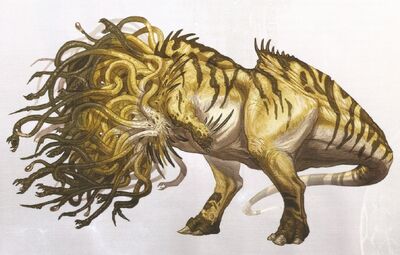Mujidavar are grotesque beasts native to the Fields of Dore on the Gloaming.
Background
Mujidavar are bipedal, scaly monstrosities with long tails. Where normally a head would reside, instead a mujidavar possess a squirming mass of tendrils and tiny maws. Some of the tendrils end in bony blades, while others in bulbous eyes, and a few more in even more tiny mouths.[1]
Abilities and Traits
Motive:
Hungers for flesh
Environment:
The Fields of Dore on the Gloaming
Health:
28
Damage Inflicted:
6 points
Armor:
3
Movement:
Long
Modifications:
Both Stealth and Speed defense as level 4.
Combat:
A mujidavar can use an action to move a short distance and then proceed to attack with either its tendrils or a subsonic screech. Despite having a large quantity of tendrils, the creature can only use them to attack a single foe at a time.
The focused screech of a mujidavar operates at a subsonic level, which can thus scramble the sense of a single victim within short range. If the target fails an intellect defense roll, it believes that everything it sees or hears isn't precisely where it actually is. As a result, the difficulty for any attacks, tasks involving targeting of the creature and its current position, Speed defense rolls, and even movements is increased by three steps.
Interaction:
Mujidavar are basically animals - belligerent, predatory animals at that.
Use:
A pair of mujidavar is terrorizing a small isolated community, and the PCs traveling by are the villager's only hope. As a reward, they'll offer the characters the location of a recent eruption of Archadian motes.[2]
References
- ↑ Cook, Monte, et al. “Creatures.” Into the Night, Monte Cook Games, LLP, 2018, pp. 148. Numenera. ISBN 978-1-939979-40-7
- ↑ Cook, Monte, et al. “Creatures.” Into the Night, Monte Cook Games, LLP, 2018, pp. 148. Numenera. ISBN 978-1-939979-40-7

